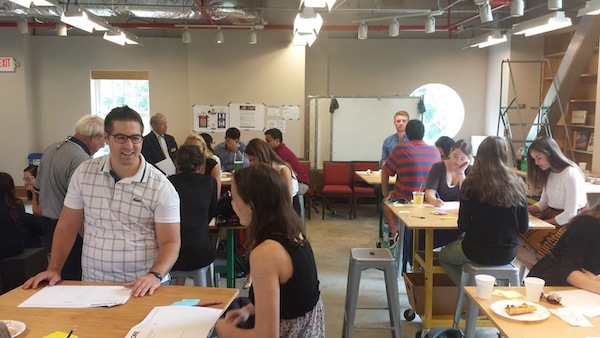The next big shift in liberal arts thinking could be developing in the Jim and Bobbie Ukrop Innovation and Design Studio in Alan B. Miller Hall. In its third year, the I.D. Studio houses several undergraduate and graduate courses inspired by ‘design thinking’ methodology, along with events and clubs like the Design Thinking Club.
“We’ve systematically trained our students to be risk adverse,” I.D. Studio coordinator and advocate Professor Michael Luchs said.
Professor Luchs emphasized that the world is populated with complex and ambiguous problems, while the problems undergraduates are trained to solve are discipline-specific and well-defined. Students are often uncomfortable with failure and ambiguity in traditional classrooms. Design thinking is intended to equip students with the tools to address more complex problems with creative confidence.
“We really see this as a part of fundamentally changing the higher education system,” Luchs said.
The I.D. Studio is sparsely furnished with minimalist tables, stools and whiteboards on wheels. Everything can be easily rearranged for different lesson plans and events, including creating stations for group work or class discussions. It can be reserved for private events through Dana Hill of the Mason School of Business.
“The space is intended to take the faculty or speaker off the stage,” Luchs said.
Classes taught in the space also try and incorporate “flipped classroom” techniques, meaning students learn basic concepts independently and apply these strategies in class under the guidance of their professors.
“Some ideas can be conveyed through speech alone, but you really need to get your hands dirty if you are leaning to solve problems,” Design Thinking Club President Jiaorui Jiang said in an email.
The Design Thinking Club hosts speakers and workshops centered on the principles of design thinking in the I.D. Studio.
“We use the Studio as the primary location for our events because it has this open atmosphere that urges students to get hands-on … students use the materials available in the Studio to build prototypes for their ideas,” Jiang said.
Design Thinking is not limited to designing products — it is intended to be a methodology that can be applied to any complex problem and is based on feedback and idea iteration.
According to a March 26 article in “The Chronicle of Higher Education” by Peter Miller, Design Thinking is revolutionizing undergraduate studies by developing skill-based, rather than knowledge-based, expertise. Miller describes how Stanford University is working to incorporate design thinking into their undergraduate programs through their “d. school”, a more extensive but similar program to the I.D. Studio.
“Tapping into our individual potential to think creatively is essential to a meaningful life,” Luchs said.

